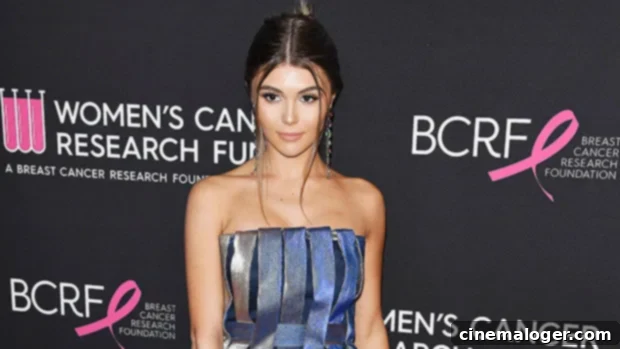The View Co-Hosts Decry Olivia Jade’s ‘Red Table Talk’ Apology, Unpacking Privilege in College Admissions Scandal
The highly anticipated appearance of social media influencer Olivia Jade Giannulli on Jada Pinkett Smith’s “Red Table Talk” sparked considerable debate, particularly among the co-hosts of “The View.” While Olivia Jade aimed to address her involvement in the infamous college admissions scandal, the panel from “The View” largely concurred with “Red Table Talk” co-host Adrienne Banfield-Norris: the apology fell significantly short of expectations. In an impassioned discussion during their December 8 episode, the hosts vehemently criticized the daughter of Lori Loughlin and Mossimo Giannulli – both currently serving prison sentences for their roles in bribing USC officials to secure their daughters’ admission – for her perceived failure to acknowledge her white privilege and the profound impact her actions had on other aspiring students. The conversation didn’t shy away from strong condemnation, with co-host Ana Navarro famously labeling the YouTuber an “entitled brat.”
OLIVIA JADE ON WHITE PRIVILEGE: The co-hosts continue their takeaways from the recent #RedTableTalk interview with Olivia Jade and her role in the college admissions scandal. https://t.co/UEtV2wdMOM pic.twitter.com/45nr1gxtSE
— The View (@TheView) December 9, 2020
The “Red Table Talk” interview was Olivia Jade’s first public statement since the scandal broke, and it was widely anticipated that she would use the platform to offer a sincere apology and demonstrate a newfound understanding of her past mistakes. However, for many viewers and critics, including the panel on “The View,” her words did not convey the depth of remorse or comprehension expected for such a significant transgression. The core of the criticism revolved around the influencer’s apparent inability to grasp the profound implications of her privileged position and how it played into the scandal, often referred to as Operation Varsity Blues.
Sunny Hostin, a legal analyst and co-host, initiated her assessment by acknowledging some blame on Olivia Jade but ultimately placing the bulk of the responsibility on her parents. “I don’t think she went far enough, but I do put most of the blame on her parents,” Hostin asserted. She elaborated on the fundamental role parents play in instilling ethical values in their children, regardless of their socioeconomic standing. “They should have taught her better. It’s been very difficult for me to understand. Because while my children have grown up with a certain amount of wealth, as I did not, we made sure to teach them that cheating is never appropriate.” This sentiment resonated deeply, highlighting the expectation that wealth should not excuse a lapse in moral education. Hostin’s perspective underscored the idea that financial comfort, while providing advantages, does not absolve parents of the responsibility to teach integrity and fair play.
Hostin then drew a powerful parallel to her own family, emphasizing the dedication required for legitimate athletic pursuits. Her two children, son Gabriel, 17, and daughter Paloma, 13, are both committed student athletes. She spoke at length about the rigorous training, discipline, and sheer hard work they pour into their respective sports. This was in stark contrast to Olivia Jade and her sister, Isabella Giannulli, who were fraudulently admitted to the University of Southern California (USC) as part of the crew team despite neither having any prior competitive rowing experience. This deceit was not merely a shortcut; it was a direct usurpation of opportunities from deserving students. Hostin powerfully articulated the severe injustice: “For many Black children, being an athlete is one of the only entrances into college. And for Olivia Jade to try to take one of those legitimate spots from another athlete I just think is deplorable. And she didn’t address that.”
This point from Hostin was crucial, exposing the deeper layers of inequality inherent in the scandal. For many marginalized communities, athletic scholarships or recognition can be a lifeline, a hard-earned pathway to higher education that might otherwise be inaccessible. When spots are purchased or manipulated by affluent families, it doesn’t just impact individuals; it reinforces systemic barriers and diminishes the value of genuine merit and effort. The failure of Olivia Jade to acknowledge this specific aspect of her privilege – how her actions directly harmed other students’ legitimate dreams and opportunities – was a significant sticking point for “The View” panel and much of the public.
Olivia Jade, in her “Red Table Talk” interview, repeatedly stated that she was “ashamed” of her family’s actions and recognized that they had “messed up.” While these sentiments might be a starting point, Sunny’s co-host Sara Haines agreed that such expressions were merely the initial step on a very long road to redemption. “It was a step she had to take, but she’s got about 99 more before she’s earning respect back, and I think her actions will speak louder than her words,” Haines explained. Her commentary underscored the idea that an apology is only as strong as the demonstrable change in behavior and understanding that follows it. True accountability, Haines suggested, would require more than just verbal regret; it demands tangible actions that reflect a genuine shift in perspective and a commitment to making amends, perhaps through advocacy for educational equity or supporting underprivileged students.
Haines also took issue with Olivia Jade’s often-cited defense of growing up “in a bubble.” “I’ll give her a minute. But I don’t buy her ‘I grew up in a bubble’ excuse. She’s 20 years old; I expect more from my four-year-old.” This specific critique resonated with many who felt that at 20 years old, one should possess a basic understanding of right and wrong, and the consequences of one’s actions, regardless of upbringing. The “bubble” excuse, while potentially explaining a lack of exposure to certain realities, does not excuse a fundamental lack of ethical judgment or an inability to empathize with those whose opportunities were stolen. It was perceived as an attempt to deflect personal responsibility rather than a genuine acknowledgment of culpability.

While Whoopi Goldberg chose to moderate the robust discussion and refrained from offering her personal opinion on Olivia Jade’s situation, the final word came from Ana Navarro, whose assessment was both scathing and definitive. “I really have no interest in talking about this entitled brat and her enabling parents… I don’t really have the bandwidth to give a hoot about Olivia Jade wanting her platform back.” Navarro’s blunt remarks encapsulated the exhaustion and frustration felt by many toward individuals seeking to quickly rehabilitate their image after involvement in serious misconduct, especially when that misconduct exploited systemic inequalities. The idea of “wanting her platform back” suggested a self-serving motivation rather than a deep, selfless desire for atonement or genuine change.
The entire conversation on “The View” served as a microcosm of the broader public discourse surrounding the college admissions scandal and white privilege. Operation Varsity Blues exposed a shocking level of manipulation and corruption within the elite echelons of American society, where wealth could seemingly circumvent meritocratic systems. The scandal highlighted how affluent parents could buy their children’s way into prestigious institutions, often by creating fraudulent athletic profiles, thus stealing legitimate opportunities from deserving students. This underscored the deep-seated inequities in the education system, where access is often dictated by financial resources rather than pure academic or athletic achievement.
Olivia Jade’s case, amplified by her status as a social media influencer with a massive following, brought these issues into sharp focus. Her perceived lack of awareness regarding her privilege was particularly grating for many. White privilege, in this context, refers to the unearned advantages and immunities that come with being part of the dominant racial group, often resulting in a belief that rules are flexible or consequences are less severe. The public expected her to not only apologize for her parents’ actions but also demonstrate an understanding of how her race and wealth afforded her privileges that other students could only dream of. The “bubble” she claimed to live in was precisely the problem – a bubble that shielded her from the realities faced by most people and contributed to a sense of entitlement.
Ultimately, “The View” co-hosts’ strong condemnation of Olivia Jade’s “Red Table Talk” interview reflected a collective frustration with the perceived lack of genuine accountability from those involved in the college admissions scandal. While the influencer made an attempt to speak publicly, the consensus was that her words lacked the sincerity and depth of understanding required for true reconciliation. Regaining public trust and respect, as Sara Haines pointed out, will require more than just an interview; it will demand consistent, authentic actions that demonstrate a profound shift in perspective, a commitment to learning from her mistakes, and a tangible effort to address the systemic inequalities that her family’s actions so starkly highlighted.
